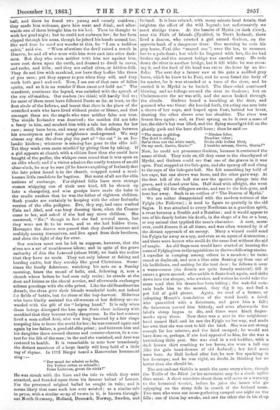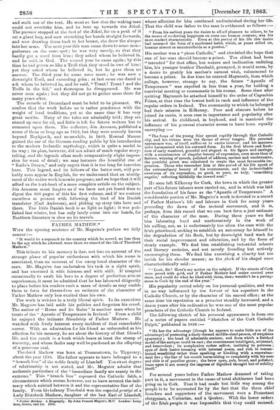ICELANDIC POPULAR STORIES AND FAIRY-TALES.* ONCE upon a time an
Icelander lost his way ; he wandered about till ha came to a strange dwelling, and knocked at the door; it was opened by an elderly woman, and she bade him come in'; there were order and comfort everywhere. She led him into the
• Isleackar TIVadsligur og Alintgri saroad hefir Ida Amason. Fyrsta Bindl, Leip- zig. 1862.
hall, and there he found twa young and comely maidens ; they made him welcome, gave him meat and drink, and after- wards one of them brought him to his bed. Then he thought to wish her good night ; but he could not embrace her ; for her form slipped through his arms, though he joined his hands around her. She said that he need not wonder at this, for "I am a bodiless spirit," said she. "When afaretime the devil raised a revolt in
Heaven, he and all who were with him were cast into utter dark- ness. But they who were neither with him nor against him, were cast down upon the earth, and doomed to dwell in caves, and rocks, and hills ; and they are called elves, or hidden-folk. They do not live with mankind, nor have they bodies like those of you men ; yet they appear to you when they will, and they work both good and evil. Now, I am one of that race of fallen spirits, and so it is no wonder if thou canst not hold me." The wanderer, continues, the legend, was satisfied with the speech of the coy elf-maiden. Our readers (we think) will hardly feel so ; for most of them must have followed Dante as far, at least, as the first circle of the Inferno, and learnt that there is the place of the wretched souls who have lived without praise or blame, and that amongst them are the angels who were neither false nor true. The simPe Icelander was deceived ; the maiden did not take a fancy to him, and mocked him with a tale too solemn for her race ; many have been, and many are still, the dealings between his countrymen and their neighbours underground. We may almost say that the elves play the part of" the cat" in an Ice- landic kitchen ; whatever is missing has gone to the elfin hill. Yet they work even more mischief by giving than by taking. If a girl appears at church with a ribbon finer than she could have bought of the pedlar, the whisper runs round that it was spun on an elfin wheel; and if a visitor admires the costly texture of an old altar-cloth, he may be sure (if he knows anything of Iceland) that the late priest found it in the church, wrapped round a semi- human little candidate for baptism. But worst of all are the elfin notions of exchange. Far-sighted folks have seen strange women whipping one of their own kind, till he shrank up into a changeling, and wise gossips have made the babe in the cradle confess that he was the father of eighteen children. Such pranks are certainly in keeping with the other Icelandic version of the elfin pedigree. Eve, they say, had once washed Cain and Abel, and was busy dressing them, when the Creator came to her, and asked if she had any more children. She answered, "No ;" though in fact she had several more, but they wera not fit to be seen, and so she had hidden them. Hereupou the decree was passed that they should increase and multiply among themselves, and live apart from their brethren, and shun the light of day for ever.
Our readers must not be left to suppose, however, that the elves are a set of troublesome idlers; and in spite of the grave authority of Jon the Learned (about 1620), we loath the notion that they have no souls. They not only labour at fishing and herding cattle, but they worship like good Christians. Some- times the lonely fisherman, watching his nets on a Sunday morning, hears the sound of bells, and, following it, sees a church where before he had seen only rocks ; he stands at the door and listens to the choral service, and afterwards exchanges solemn greetings with the elfin priest. Like the old Scandinavian dwarfs, the elves give their friends wonderful tools, not indeed far fields of battle, but for those of the hay-harvest. Midwives who have kindly assisted the elf-woman at her delivery ara re- warded with the gift of the "helping hand." It is only when these beings disregard the ban upon their close intimacy with mankind that they become really dangerous'. In the last century lived a man called Anti, who was long haunted by a fair shape tempting him to leave the world for her; he was rescued again and again by her father, a good old elfin priest ; and between him and his daughter there ensued charms and counter-charms, in a con- test for the life of the man ; in the end she vanished, and Arni was restored to health. It is remarkable to note bow tenaciously the distant members of a large family will keep hold of a little tag of rhyme. In 1773 Biirger heard a Hanoverian housemaid sing :—
"Der mond der scheint so belle, Die Todten reiten so schnelle ; Fein, Liebchen, grant dir nicht f"
He was struck with the lines and the tale to which they were attached, and founded upon them Ids famous ballad of Lenore. For the presumed original ballad he sought in vain; and it seems likely that none such has ever existed ; as a similar tale in prose, with a similar scrap of verses in it, is known through- out North Germany, Holland, Denmark, Norway, Sweden, and
Iceland. It is here related, with many minute local details, that heighten the effect of the wild legend ; but unfortunately we
must abridge them. At the hamlet of Mvrki (or dark river), near the Firth of Islands (Eyafiord, in North Iceland), there
lived a deacon, who courted a girl named Gudrun, on the opposite bank of a dangerous river. One morning he rode his grey horse. Faxi (the "maned one") over the ice, to summon
her to a yule-feast ; but while ho lingered with her, the ice had broken up, and the nearest bridge was carried away. He rode down the river to another bridge, but it fell while he was cross- ing it, and the back of his head was cut to the bone by an ice- flake. The next day a farmer saw at his gate a saddled grey horse, which he knew to be Faxi, and he soon found the body of its master, for it was stranded at a turn of the river, and he carried it to Myrkii to be buried. The thaw-wind continued blowing, and no tidings crossed the river to Gudrun ; but on Christmas-eve the air was still, and the moon looked through the clouds. Gudrun heard a knocking at the door, and guessed who was there: she hurried forth, thrusting one arm into a sleeve of her cape, and leaped upon Faxi, behind her lover, drawing the other sleeve over her shoulder. The river was frozen firm. again ; and, as Faxi sprang on to it over a mass of ice, the rider'i hat was lifted, and the flying moonlight fell on the ghastly gash and the bare skull bone; then he said :—
"The moon is gliding, " Maninn lidur,
The dead is riding ; Daudinn ridur ; See'st thou not the white mark, Sdrdu ekki hvitan blett, On my neck, Garda, Gardn?" I hnakka minum, Gardn, Garda?"
Now, he could not pronounce Gudrun, because it contained the
name of God. They rode on, till they came to the churchyard of Myrki, and Gudrun could see that one of the graves in it was open. Faxi stopped at the lich-gate, and sho sprang off and clung to the rope of the lich-gate bell. She felt something lay hold of her cape, but one sleeve was loose, and the other gave way. At the first toll of the bell she saw the spectre plunge into the grave, and it closed over him. Half dead with affright, she went on tolling till the villagers awoke, and ran to the lich-gate, and bore her away. Such is an outline of " The Deacon of Myrkl." We are rather disappointed with the modern notions of the Fylgia (the Follower) ; it used to figure so quaintly in the old Sagas. It was attached to every Northman as a guardian spirit, a cross between a Double and a Banshee ; and it would appear to one of his family before his death, in the shape of a fox or a bear, or any animal that typified the man's character. A seer, more- over, could discern it at all times, and was often warned by it of the distant approach of an enemy. Many a wizard could send his Fylgia far away as a spy, and even as an agent of destruction ; and there were heroes who could do the same feat without the aid of magic. An old Saga-man would have started at hearing the
name o f Fylgia given to the apparitions in the two following stories A traveller is camping among others in a meadow ; he turns round at daybreak, and sees a blue mist floating up from one of
his bedfellows, and making for the tent door ; he follows it over a water-course (the details are quite funnily material), till it enters a green mound; after awhile it floats back again, and sinks down into the sleeper, who awakes, and wishes he could take the same road that his dream bas been taking ; the wakeful com- rade leads him to the mound, they dig it up, and find a pot full of gold pieces. Again, we read of a farmer, or
(adopting itilunch's translation of the word Londi) a laird, who quarrelled with a fisherman, and gave him a fall ; the fisherman cursed him bitterly, and soon afterwards the laird's sheep began to die, and there were black finger- marks upen them. Now there was a seer in the neighbour- hood named Hall, and he saw the Fylgia on her way, and made
her own that she was sent to kill the laird. She was not strong enough for her mission, and the laird escaped ; Ike would not have done so, perhaps, if she had appeared to him, for she was a bewitching little pest. She was clad in a red boddice, with a dark brown skirt reaching to her knees, she wore a tall cap (like the gala head-dresses of old Iceland) ; her fatal arms were bare. As Hall looked after her, he saw fire sparkling in her footsteps; and he was right, no doubt, in thinking her no better than she should be.
The out-and-out Goblin is much the same everywhere, though the Trolls of the J6kul (or ice mountain) may be a shade uglier than usual. A short anecdote about them will serve as a warning to the botanical tourist, before lie joins the lasses who go
ag,ipsyini on the stony fells in search of the Iceland moss. Two men who were out moss-gathering camped one night. on the fells ; one of them lay awake, and saw the other rise in his sleep
and stalk out of the tent. He went so fast that the waking man could not overtake him, and he bent up towards the Jokul. The pursuer stopped at the foot of the Jokul, for on a peak of it sat a giant hag, and now stretching her hands straight forwards, and now drawing them back to her breast, she drew the sleeper into her arms. The next year this man came down to some mos 3- gatherers on the same spot ; he was very moody, so that they hardly got a word from him ; they asked whom lie believed in, and he said, in God. The second year he came again ; by this time he had grown so like a Troll that they stood in awe of him ; yet they asked whom he believed in, but he gave them no answer. The third year he came once more ; he was now a downright Troll, and exceeding grim ; at last some one dared to ask whom he believed in, and he said, " Truntl Trunt ! and the Trolls in the fell," and thereupon he disappeared. He was never seen again ; but they did not go to gather moss there for many years after.
The records of Dreamland must be brief to be pleasant. We confess that the work before us is rather ponderous with the weight of local traditions, yet at the same time it has very great merits. Many of the tales are admirably told; they are stored up once for all, and little is left for future writers but to comment upon them. The collector, Jon Amason, published a score of them so long ago as 1852, but they were scarcely known beyond Reykjavik, and meanwhile, in 1860, Konrad Maurer gained the ear of the German reading public by his introduction to the modern Icelandic mythology, which is quite a model in its way ; its plan, however, did not admit of much regular story- telling, and the legends often made comparatively slight impres- sion for want of detail ; we may instance the beautiful one of "Katie's Dream," and only regret that it is too long for insertion here. This legend, and its fellows of the better sort, will pro- bably soon appear in English, for we understand that an abridg- ment of the entire work is now in progress; and we hope that it will afford us the text-book of a more complete article on the subject. J6n Arneson must forgive us if we have not yet found time to digest the 666 pages of this his first volume, and if we content ourselves at present with following the lead of his Danish translator (Carl Andersen), and picking up stray bits here and there. The little Danish book is as light as light ; it was pub- lished last winter, but has only lately come into our hands, for Northern literature is slow on its travels.




































 Previous page
Previous page